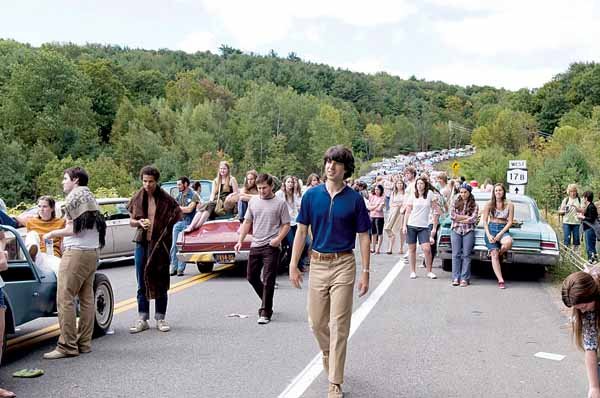LITTLE ROCK — A light comedy that feels like a make-work scheme between more ambitious projects, Ang Lee's Taking Woodstock is at once a fluent display of technical precision and an under-realized reiteration of '60s cliches. It's likely to irritate the people who might seem to be its natural constituency, the people who remember - or as the old joke goes, can't remember - the '60s while affirming the prejudices of those who consider baby boomers insufferably self-indulgent cultural imperialists.
Movie
Taking Woodstock ******* 1/2
A young man (Demetri Martin) and his family, facing foreclosure on their dumpy Catskills motel in 1969, learn that 500,000 music fans are on their way to a neighbor's farm for a music festival. With Emile Hirsch, Imelda Staunton; directed by Ang Lee.
Maybe the best way to receive the film is as a symphony of faces and period details, the product of meticulous research and lots of looking at old issues of Life magazine. And probably more than a few screenings of Michael Wadleigh's concert film Woodstock, which is probably the most significant reference for those of us who weren't actually at the festival. (Jonathan Groff's impersonation of promoter Michael Lang may or may not be a miracle of casting, but he nails the beatific aura Lang projected in Wadleigh's documentary.)
Lee's way into the zeitgeist-shifting concert is the allegedly true story of Elliot Tiber, nee Teichberg, who somewhat unwittingly played a huge role in pulling off the festival. Elliot (played by comedian Demetri Martin) is just a good Jewish son striving to keep his immigrant family's motor lodge solvent while simultaneously leading a fabulous (and deeply closeted) gay life in Manhattan.
As a very young president of the local chamber of commerce, Elliot just happens to hold a festival permit that he offers to the Woodstock promoters when plans to hold the festival in a neighboring town fall through. (As a lot of old hippies will tell you, the Woodstock Music and Arts Festival wasn't actually held in the picturesque upstate New York community implied by its name but in the White Lake hamlet outside Bethel, some 40 miles southwest of Woodstock.)
It's not long before Elliot realizes the implications of his cute ploy to drum up business for his parents' business. When Lang arrives, via helicopter, accompanied by a phalanx of lawyers and advance people, it's clear that the swampy little clearing where Elliot planned to hold a chamber music concert will be insufficient for what the promoters have planned. This leads them to the iconic Max Yasgur (Eugene Levy) and his famous dairy farm.
Which gets us to the central problem of Lee's strategy; with so many monuments to visit, the film feels a little like a field trip to a museum of hippie kitsch. And there's a self-congratulatory coyness that occasionally creeps into the script - as when one of Elliot's old lovers calls, apparently simply to allude to his participation in the Stonewall riots. It's as though Lee is trying to replicate Elliot's essential experience of Woodstock - he's right in the middle of everything yet he still manages to miss the concert.
While Martin does a great job at eliminating any tics from his performance, he's surrounded by florid hams. Emile Hirsch is simply awful as a Dennis Hopper-inspired 'Nam vet. Dan Folger grates as the leader of an experimental theater troupe that delights in dropping trou. And the best thing in the obligatory acid-dropping scene (with a wasted, in more ways than one, Paul Dano and Zoe Kazan) is the delayed onset and saturated Matisse color of the animated visions. (For a generally cerebral filmmaker, Lee has a genuine knack for making you feel.)
And, when at the end of the movie, Lang rides up on a painted pony and announces his next move will be a mind-blowing free concert in the Bay Area featuring the Rolling Stones - which turned out to be the horror show that was Altamont - I wanted to go all Pete Townshend on Abbie Hoffman on the character.
And while Elliot's gayness is presented in a very matter-offact 21st-century manner, the uglier truth is that there were very good reasons for homosexuals to try to pass as straight in 1969 - tolerance had its limits, even among free love counterculturalists.
But the sometimes smirking tone and deliberate slightness is countered to some extent by a handful of grace notes, including Liev Schreiber's amusingly humane portrayal of an ex-Marine turned transvestite security guard and the bravado performance of Imelda Staunton as Elliot's over-the-top stereotypical mother. It's nice that Lee doesn't ever try to depict the bands onstage, but simply lets their music charge the atmosphere or fade into the background hum.
And the single best scene in the film is a ride on the back of a mellowed out cop's motorbike through the snaking detritus of the era, an unbroken take that wends through the hippie humanity like Godard trucked up the cluttered road in Weekend.
While my overall impression is mildly favorable, it's hard to get past the idea of Taking Woodstock as a missed opportunity. It's fine around the edges, but it never convinces you that the central event was the cataclysmic cultural convergence some claim. Maybe it wasn't. Whatever, man.
Taking Woodstock85Cast: Demetri Martin, Imelda Staunton, Jonathan Groff, Eugene Levy, Emile Hirsch, Liev Schreiber Director: Ang Lee Rating: R, for language, nudity, sexual situations and drug use Running time: 120 minutes
MovieStyle, Pages 35, 40 on 08/28/2009
